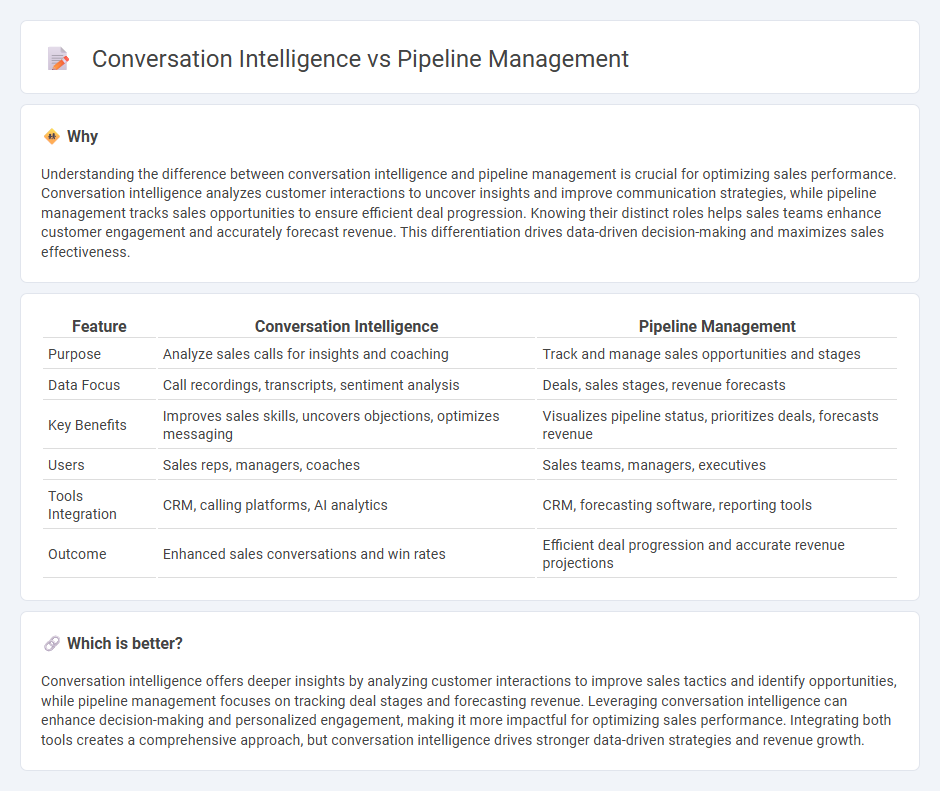
Conversation intelligence software analyzes sales calls and meetings to extract actionable insights, improving communication strategies and customer engagement. Pipeline management tools organize and track sales opportunities through various stages, ensuring accurate forecasting and efficient deal progression. Discover how combining conversation intelligence with pipeline management can elevate your sales performance.
Why it is important
Understanding the difference between conversation intelligence and pipeline management is crucial for optimizing sales performance. Conversation intelligence analyzes customer interactions to uncover insights and improve communication strategies, while pipeline management tracks sales opportunities to ensure efficient deal progression. Knowing their distinct roles helps sales teams enhance customer engagement and accurately forecast revenue. This differentiation drives data-driven decision-making and maximizes sales effectiveness.
Comparison Table
| Feature | Conversation Intelligence | Pipeline Management |
|---|---|---|
| Purpose | Analyze sales calls for insights and coaching | Track and manage sales opportunities and stages |
| Data Focus | Call recordings, transcripts, sentiment analysis | Deals, sales stages, revenue forecasts |
| Key Benefits | Improves sales skills, uncovers objections, optimizes messaging | Visualizes pipeline status, prioritizes deals, forecasts revenue |
| Users | Sales reps, managers, coaches | Sales teams, managers, executives |
| Tools Integration | CRM, calling platforms, AI analytics | CRM, forecasting software, reporting tools |
| Outcome | Enhanced sales conversations and win rates | Efficient deal progression and accurate revenue projections |
Which is better?
Conversation intelligence offers deeper insights by analyzing customer interactions to improve sales tactics and identify opportunities, while pipeline management focuses on tracking deal stages and forecasting revenue. Leveraging conversation intelligence can enhance decision-making and personalized engagement, making it more impactful for optimizing sales performance. Integrating both tools creates a comprehensive approach, but conversation intelligence drives stronger data-driven strategies and revenue growth.
Connection
Conversation intelligence enhances pipeline management by analyzing sales calls and interactions to identify key buying signals and customer needs. This data-driven insight enables sales teams to prioritize high-value opportunities and tailor follow-ups, improving deal progression and forecast accuracy. Integrating conversation intelligence tools with CRM systems streamlines pipeline visibility and accelerates revenue growth.
Key Terms
**Pipeline Management:**
Pipeline management involves tracking and organizing sales opportunities to optimize revenue flow and forecast accuracy. It leverages CRM tools to visualize deal stages, prioritize prospects, and ensure timely follow-ups, enhancing overall sales efficiency. Explore how advanced pipeline management strategies can transform your sales process and boost conversion rates.
Lead Qualification
Pipeline management systems streamline the sales process by tracking and prioritizing leads based on their position in the sales funnel, enhancing lead qualification efficiency. Conversation intelligence analyzes sales calls and interactions to extract valuable insights, enabling sales teams to tailor their approach and identify high-potential leads more accurately. Explore how integrating pipeline management with conversation intelligence can optimize lead qualification strategies and boost sales performance.
Deal Stages
Pipeline management systematically tracks deal stages to ensure accurate forecasting and identify bottlenecks in the sales process. Conversation intelligence leverages AI to analyze sales calls, providing insights into buyer intent and stage-specific communication effectiveness. Explore how integrating these tools can enhance deal stage accuracy and sales outcomes.
Source and External Links
What is pipeline management? - Pipeline management is the practice of overseeing and optimizing sales opportunities as they move through the sales cycle stages, involving segmenting the pipeline, measuring performance with key metrics, allocating resources, and using real-time data to improve processes.
What is Pipeline Management? - Sales pipeline management involves maintaining a healthy sales pipeline by tracking the flow of leads at every stage, managing numerous leads with their individual needs, and using tools like CRM software to act on the data effectively.
Sales Pipeline Management: The Complete Guide - It is the process of guiding and improving sales opportunities through the stages to maximize closing deals, preventing risks like missed leads, wasted resources, and poor customer experiences caused by disorganized sales pipelines.
 dowidth.com
dowidth.com